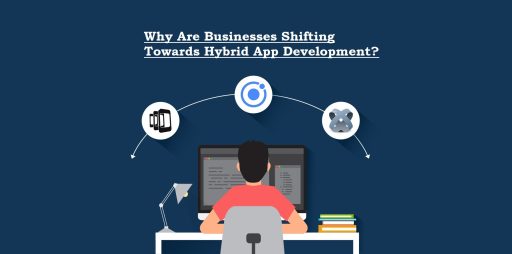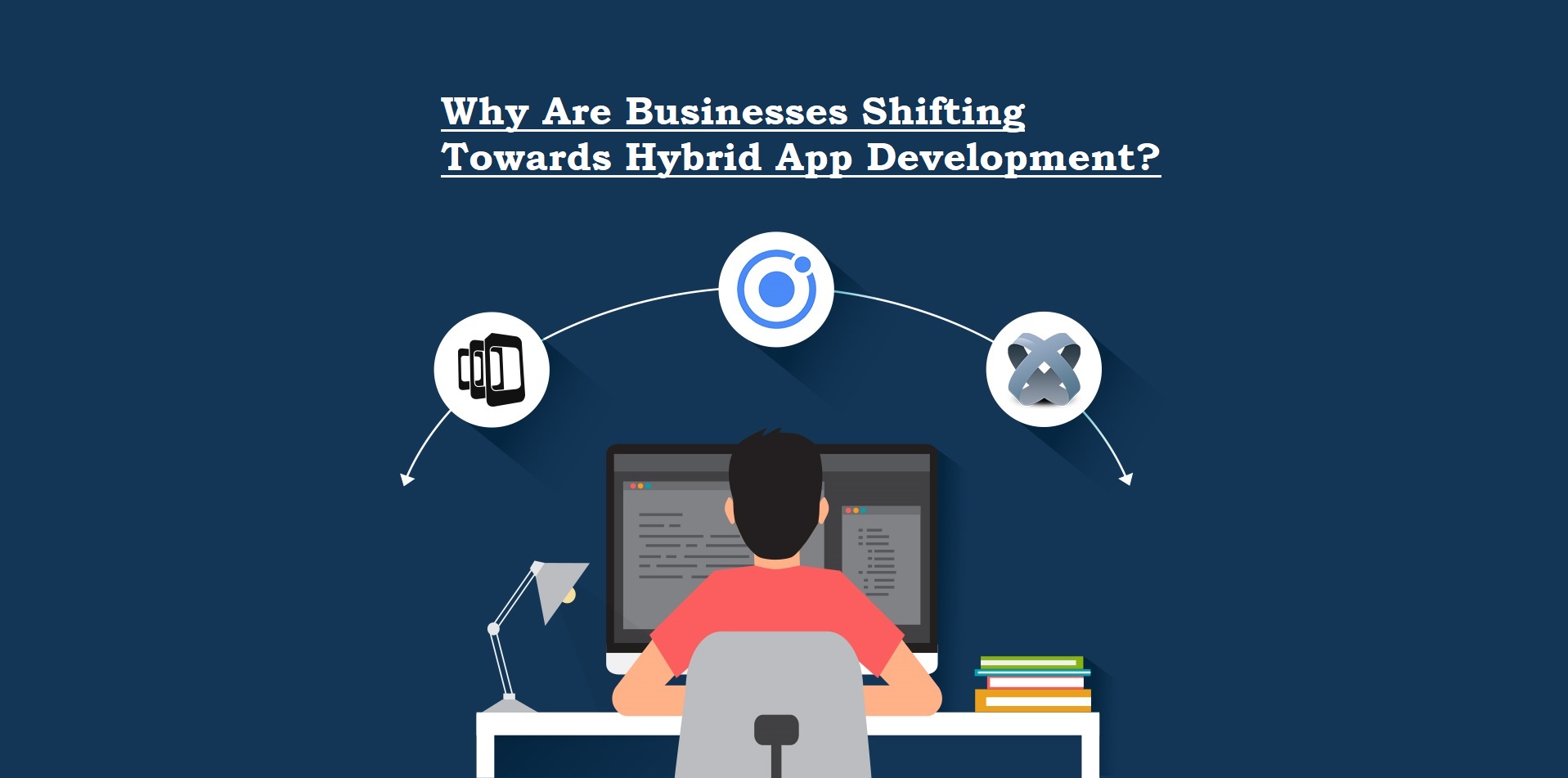Have you noticed that many businesses are introducing apps that help them provide exceptional user experiences to their customers across Android and iOS? That is not a coincidence; it results from a growing shift towards hybrid app development.
The popularity of hybrid apps is becoming a tactic to stay ahead of the curve rather than just being a trend. In this blog, you’ll learn why companies choose hybrid applications instead of native ones. We’ll keep it simple, informative, and helpful to help you get all the answers and a hybrid app for your business.
Is your mind struck with the question, “What is a hybrid app?” A hybrid app uses different front-end development languages like HTML5, JavaScript, and CSS and combines elements of both native and web apps.
Simply put, your app developers won’t have to create individual codes for Android and iOS. They will write the code once while providing seamless functionality across multiple devices.
What’s Driving the Popularity of Hybrid Apps in 2025?
Everything has revolutionized in the past few years, especially how people use mobile apps. Here are some reasons pushing business owners to invest in a hybrid app development company for custom mobile app development.
Cross-Platform Demand
Indeed, users are no longer loyal to a single platform, which is why the rise of cross-platform app development services is in high demand. A simple example: people use Android phones at work, tablets for entertainment, iPhones at home, and tablets for leisure. This is why many business owners aim to develop an app for their customers that can work flawlessly on every device.
Less Time-Consuming
In 2025, companies are moving faster than before. With the help of hybrid frameworks, you don’t have to wait 12 months anymore to launch and deploy your app. Instead of spending an entire year on development for separate platforms, entrepreneurs can build one app that functions properly across iOS and Android.
Talent Shortage
Let’s be real: choosing mobile app developers with expertise in both Android and iOS is not only challenging but also expensive. Hiring two separate teams will result in more time spent on coordination, more costs, and longer timelines to complete the entire development and deployment process.
Hybrid development ends your hassle by allowing you to work with one skilled team to ideate, develop, and deploy a single app catered to iOS and Android. It reduces the complexity without compromising the quality.
ROI Pressure
The budgets are tight, and companies want to invest in mobile app development services that result in maximum return on their investments. Hybrid apps are a more budget-efficient option. By getting a single codebase that works on multiple platforms, firms can save their investments on long-term app maintenance and support.
Also Read about How Much Does it Cost to Build an App in the USA in 2025
Opportunity to Reach a Broader Audience
Since native apps are built for one operating system, you can create an app for iOS or Android users. Hybrid apps can work on iOS and Android without building separate apps for each platform. This major plus point can help you reach a wider audience across both operating systems without building specific apps for each platform.
Helps Maintain Brand Consistency
Every business owner wants to have a consistent digital presence. A hybrid application makes it easier to maintain a consistent branding in terms of the fonts, colors, icons, or layout across every platform. This improves the professional image of your business and makes the users feel more connected to your brand.
Simplified Testing and Quality Assurance
Testing is one of the significant steps of the app development process. Your Quality Assurance team will only need to test a single codebase, simplifying the entire process significantly. Fewer code variations result in fewer bugs. It reduces the testing time and provides quick results.
Enhanced Developer Productivity
Hybrid frameworks allow developers to use the code, plugins, and libraries multiple times, increasing productivity and resulting in faster development. It frees the developers from writing and managing two separate codebases, enabling them to focus on developing better features and optimizing the overall performance.
The Hybrid App Frameworks
To build a hybrid application, developers leverage multiple frameworks and tools. These are listed below:
1. React Native
Many of the most successful hybrid apps, such as Instagram, use this framework. Developed by Facebook, React Native can compile your codebase into native code. This means you can use native views instead of the traditional webview of most hybrid app frameworks. It contributes to efficient coding, leading to consistent performance across all devices.
2. Flutter
The Google-powered Flutter is well-known for its visually appealing hybrid applications. It uses the Dart programming language to provide native-like experiences. With the help of Flutter widgets and other capabilities, app developers can create hybrid apps with more impressive user interfaces, exceptional performance, and smooth functionality across every platform and device.
3. Ionic Framework
Another popular choice for hybrid apps, the Ionic Framework has a vast library of UI tools and components optimized for flexible workflows on iOS and Android. It’s considered an open-source toolkit for building high-performing, trendy cross-platform apps using a single codebase.
4. Xamarin
Xamarin is a widely used hybrid app framework for creating cross-platform mobile applications with only one codebase written in C#. Businesses can save time and resources by enabling shared business logic, backend code, and UI components. Xamarin provides access to hardware features and native APIs, ensuring your hybrid apps offer the same performance as native apps.
5. NativeScript
Another open-source framework used for hybrid app development, NativeScript is a wise option, allowing developers to create native Android and iOS apps using Angular, JavaScript, or TypeScript. It provides direct access to native APIs without any Web Views, guaranteeing better performance and a native-like experience.
6. Apache Cordova
Apache Cordova is a framework that simplifies the implementation of hybrid apps. It provides access to HTML, CSS, and JavaScript web technologies, bridging the gap between web and mobile platforms. It also provides the users with camera and GPS device functions. With its extensive plugin library, Cordova contributes to the effortless and efficient integration of new functionalities.
Why are Hybrid Apps a Smart Business Choice?
In today’s technology-driven world, the focus of the mobile-first experience is expanding. To stay relevant, businesses opt for mobile apps to provide their consumers with the best solutions. Hybrid app development is the most cost-effective and appropriate option for companies to help them stay ahead of the competitive curve. Below are some of the benefits of hybrid apps:
-
Cost-Efficiency
Investing in hybrid application development can be a great option to cut costs. You’ll need a large budget and more coordination if you hire two separate teams for Android and iOS development. By opting for a hybrid app, you can hire a single team to generate a single codebase, eventually reducing the expenses for the entire process.
-
Faster Development
A single codebase generally requires less time for development, without the requirement of building separate versions. It means your app idea will be ready to launch in weeks instead of months. A hybrid application is the best option for businesses that want to make their mark in the industry in less time.
-
Better User Experience
The goal behind every business app is to provide the users with a great UX, regardless of the device they use. A hybrid application offers the same look and feel on every device and platform, contributing to building brand consistency and better user retention.
-
Convenient Maintenance
A hybrid app makes the app maintenance and support services process easier and more efficient due to a single, shared codebase. You can ensure a smoother experience for all users operating on any device by making simultaneous changes across the platforms.
-
Scalability
Cross-platform app development services are an excellent choice for startups or growing businesses. You can test your hybrid app with a small audience, gather their feedback about their experience, and modify and improve the design or features according to the feedback in less time.
How are Hybrid Applications Built?
Developing a hybrid mobile application means designing an application that can run on iOS and Android. To build it, web technologies must be integrated with the native features of mobile devices. Here is a step-by-step process:
Identifying the Client’s Requirements
Every client has particular objectives that include key features they may want in their app, platform preferences, and audience targets, all of which are integral to building a strategy. Having everything clear from the client’s side helps determine the app’s primary goal and ensures that every step taken goes hand in hand with what the client anticipates.
Choosing The Right Framework
Choosing the right cross-platform for a mobile application depends on frameworks like Flutter or NativeScript, as it enables them to develop a single codebase for multiple platforms. Such choices rely on various elements like the project complexity, integration goals, and the overall complexity.
UI/UX Design
While developing an application, there are many things to be considered, such as having responsive interfaces that function properly across various devices. Although there is only a single code base to develop the app in this scenario, designs should account for all platforms so that users have a great experience using whichever device they prefer.
Front-End Development
Then, the developers will begin development using technologies like HTML, CSS, Flutter, and others. With frameworks such as React Native, this web code will be integrated with native parts of the device, like its camera or GPS.
Testing and Quality Assurance
Next, the hybrid app will be tested on many operating systems and devices to guarantee a consistent design, functionality, and performance. This is done by fixing all the bugs and issues and providing a smoother experience.
Deployment
Now, the app is ready to launch and will be submitted to the Apple App Store and the Google Play Store.
Final Thought: Is Hybrid the Dominant Choice for Your Business?
Many enterprises are opting for hybrid app development in 2025. Its advantages include speed, cross-platform reach, and cost-efficiency without compromising user experience. While the popularity of native apps is still in place, hybrid apps are now meeting the requirements of many modern businesses.
Investing in hybrid mobile app development services might be a wise and affordable decision if you’re among the business owners who want to attract a broader audience and set your business apart from the competition.
If you are having difficulty finding a reliable company to get started with your hybrid app, simply contact Appnality. With our extensive expertise in creating hybrid applications, we can help you take your first step toward a better mobile presence.






